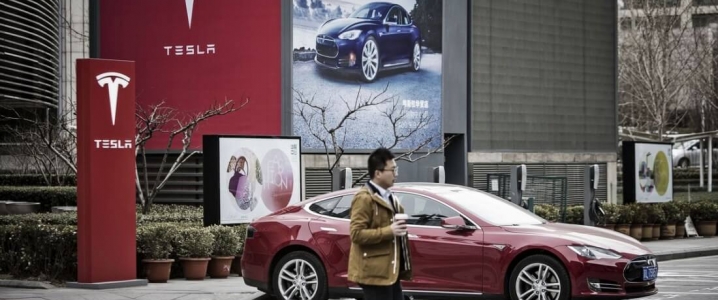China has become the hub for global electric vehicle sales, taking half the market share last year.
CBS News’ “60 Minutes” just broadcasted an in-depth look at the market as the trade war continues between the U.S. and China — and as automakers, including Tesla, move forward on playing a competitive role in the world’s largest vehicle market.
China’s appeal has become more significant for global automakers as the original hot EV market, America, becomes a tougher sell. The Trump administration is backing away from EV income tax incentives and talks between the federal government and California have reached a stalemate. The Environmental Protection Agency is expected to loosen fuel-economy and emissions requirements for upcoming new cars by the end of this year. The White House pulled the plug on negotiations with California and other states that follow its zero-emission vehicle rules.
Beijing also sees this a ripe opportunity for winning the race for companies manufacturing EVs. Requirements to create joint ventures with Chinese automakers are loosening up. Tesla is starting to build its plant in Shanghai’s free-trade zone, and BMW was granted permission last year to become the first foreign automaker to control a Chinese JV.
Chinese startup Nio was featured in the “60 Minutes” report, which helped its stock prices shoot up 8 percent Monday morning. Nio sees itself as a Tesla-competitor, but its sales are at a low level with major automakers taking much more of the share in that market. The startup has benefited from its price being about half of that of a Tesla in the Chinese market, on top of that, it doesn’t pay import taxes as it manufactures locally. Related: Saudis Leaning Toward OPEC Cut Extension
Its ES8 seven-seater saw a record 3,318 in sales during December, bringing its total to 11,348 of these EVs sold by the end of 2018. That car will be followed by the Nio ES6 five-seater in June 2019, which will boost sales even further.
But that’s only a sliver of total EV sales in China. China Passenger Car Association released sales data show that December saw a record high in “new energy vehicle” (battery electric and plug-in hybrid vehicles) sales with 159,7561 units sold. That was up 62 percent over December 2017. For all of 2018, new energy vehicles reached 1,016,002 in EV sales. That was a huge gain of 83 percent in sales over the previous year.
Nio and other Chinese EV makers are striving to become the leading Tesla-competitor in China. Tesla is feeling the squeeze on steep China import tariffs, which won’t go away until the U.S. EV-maker can set up its production plant in China. Tesla just started delivering its Model 3 electric cars to China ahead of its original schedule.
Tesla speeded up deliveries ahead of the March target originally set to meet. Those initial deliveries will go to customers who placed their orders before the end of 2018.
For now, major Chinese automakers and their foreign joint venture partners companies are dominating EV sales. Sales were topped last year by the BAIC and BYD brands.
BAIC is a state-owned company with joint venture partnerships held by Hyundai and Mercedes. BYD is another Chinese conglomerate that was funded in part by Warren Buffet’s Berkshire Hathaway. Related: UAE To Build World’s Largest Underground Oil Storage Facility
Michael Dunne, a former top executive at General Motors and auto industry consultant with expertise on the Asia market, told “60 Minutes” that China is expected to manufacture one million EVs this year — an impressive gain.
Dunne expects China to account for half the EVs sold worldwide this year. He sees it as being “totally created by the government.” While incentives will be dwindling, he expects the Chinese government to stay heavily involved in the market.
Licenses to buy cars can be steep for Chinese consumers. Several cities have offered hefty rebates to EV buyers to increase sales and help cities meet air pollution reduction targets.
Dunne said that the city of Shanghai can be very steep — $12,000 to $13,000 to buy a license for the ability to buy a car. For those buying EVs in the city, that license fee will be waived.
Chinese investor William Li believes in EV technology enough to have invested in about 40 start-ups. That includes an online auto marketplace and a new bike-sharing company.
ADVERTISEMENT
Li’s net worth is $1.2 billion, according to the report. So far, he’s put down $150 million of his own money into Nio.
Americans have been slower to adopt EVs than Chinese vehicle buyers — both in retail and fleet sales. Li too sees the Chinese government’s push in new energy vehicle sales as the main driver of growth.
Part of that plan is installing more EV chargers for public use. China wants to beat the U.S. and other players in charging stations, which also supports stronger EV sales.
By Jon LeSage for Oilprice.com
More Top Reads From Oilprice.com:
- Oil Jumps On Large Crude Inventory Draw
- Saudi Oil Production Lags Behind Peers In The Mid-East
- Hydrogen Cars Struggle To Compete With Electric Vehicles


















